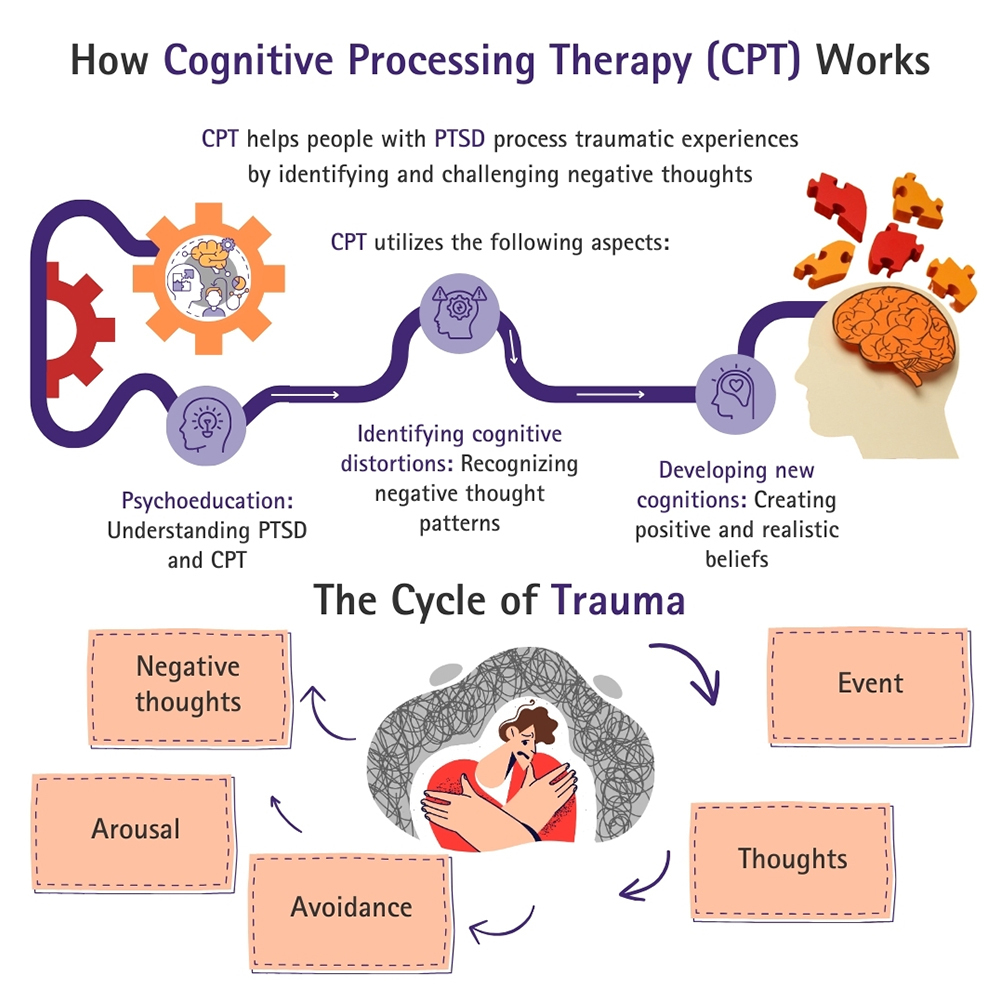What Is Cognitive Processing Therapy?
Cognitive processing therapy (CBT) is a type of cognitive behavioral therapy (CBT) that is designed to help overcome symptoms of post-traumatic stress disorder (PTSD). Trauma occurs due to the negative beliefs that result from the stressful event. CPT helps you identify the negative beliefs that have resulted from your traumatic experiences and reframe them into positive beliefs.
Under Liz Chelak’s guidance in cognitive processing therapy, I found healing from past traumas. Her patience and expertise helped me reframe my thoughts and my life. I cannot thank her enough for her support.
How Does Cognitive Processing Therapy Work?
CPT works by utilizing the following aspects:
- Psychoeducation: Your therapist will provide you with information about the process of CPT and PTSD. You will gain an understanding of why and how PTSD occurs and be prepared for what to expect in therapy.
- Identifying cognitive distortions: Your therapist will guide you through identifying your cognitive distortions. Cognitive distortions are irrational beliefs that we carry around day to day, that negatively affect us, and that are not always based on factual evidence.
- Developing new cognitions: Once you have an understanding of which beliefs are causing you distress, you can begin to change them. Your counselor will help you choose your new beliefs that are true, factual, healthy, and positive. Your new beliefs will change the way you perceive the world.
CPT is an effective treatment approach to healing PTSD. CPT has been shown to decrease symptoms and improve quality of life. Our therapists have extensive training in CPT, which means they are effective in helping you identify and reframe your negative beliefs.

Embrace Healing The Power of Trust in Therapeutic Relationships
“In my experience, the most effective aspect of therapy is the therapeutic relationship. Establishing trust between a client and clinician is the first step to healing.”
How Effective is Cognitive Processing Therapy?

CPT is a highly effective therapy for PTSD. According to a research article published in the Journal of Traumatic Stress, “CPT is a highly effective treatment for PTSD, with studies showing that up to 90% of participants experience a significant reduction in symptoms after treatment.”
Research suggests that the benefits of CPT stand the test of time and clients experience benefits and reduction in symptoms after completing treatment.
Is Cognitive Processing Therapy Evidence-Based?
Yes, CPT is an evidence-based intervention. This means it has been rigorously studied and proven to be effective in reducing PTSD symptoms.
Can Cognitive Processing Therapy Improve Depression?
CPT is a safe and effective treatment for depression. It works similarly to CBT for PTSD by helping you identify negative thoughts and beliefs and reframing them to positive beliefs. In a study of 126 women, researchers found that CPT was more effective than supportive therapy for treating and preventing depression. Another study found that CPT was more effective than other therapies, such as medication for treating PTSD in veterans.
Can Cognitive Processing Therapy Work for Anxiety and OCD?
CPT can help you overcome anxiety by helping you challenge the thoughts that lead to anxious feelings. A randomized controlled trial of CPT for generalized anxiety disorder (GAD) found that “79% of participants who received CPT no longer met criteria for GAD after treatment, compared to 29% of participants who received a waitlist control condition.” (Rizvi et al., 2012)
CPT is an effective treatment option for Obsessive-Compulsive Disorder (OCD) because it allows you to see the relationship between your obsessive thoughts and compulsive behaviors. CPT is also an excellent tool to learn coping strategies to help deal with OCD. “A randomized controlled trial of CPT for Obsessive-Compulsive Disorder (OCD) found that 69% of participants who received CPT no longer met criteria for OCD after treatment, compared to 29% of participants who received a supportive therapy control condition.” (Rizvi et al., 2012)
How Does Cognitive Processing Therapy Help for Day-to-Day Life With PTSD?
Not only does CPT alleviate PTSD symptoms, but it also helps you prevent negative effects from future stressful experiences. CPT changes the way you think and perceive day-to-day challenges. CPT gives you the tools to solve problems while remaining grounded and confident.
How Does Cognitive Processing Therapy Affect an Individual?
CPT can help you change your life in many ways including:
- Reducing PTSD
- Improving mood
- Increased positivity
- Improved quality of life
- Improving relationships
- Reduce the risk of relapse of PTSD symptoms
CPT is an empowering tool that counselors at the Trauma Therapy Center have used on hundreds of clients to help them overcome PTSD symptoms.
How Long Does Cognitive Processing Therapy Last?
Generally, CPT therapy takes 12 sessions, however, some people may benefit from more. Talk to your therapist to know what to expect.
How to Get Started With CPT:
To begin CPT, ask your therapist what to expect. They will tell you about the assessment process, which includes your therapist asking you about your history, symptoms, and goals. Then, together, you will create a treatment plan that works towards your specific goals. Your therapist will provide you with psychoeducation on how CPT works. In each session, you will work on identifying your negative beliefs and developing new belief patterns that better serve you.
To schedule an appointment for CPT in West Palm Beach with our empathetic therapists, please contact our office today.

